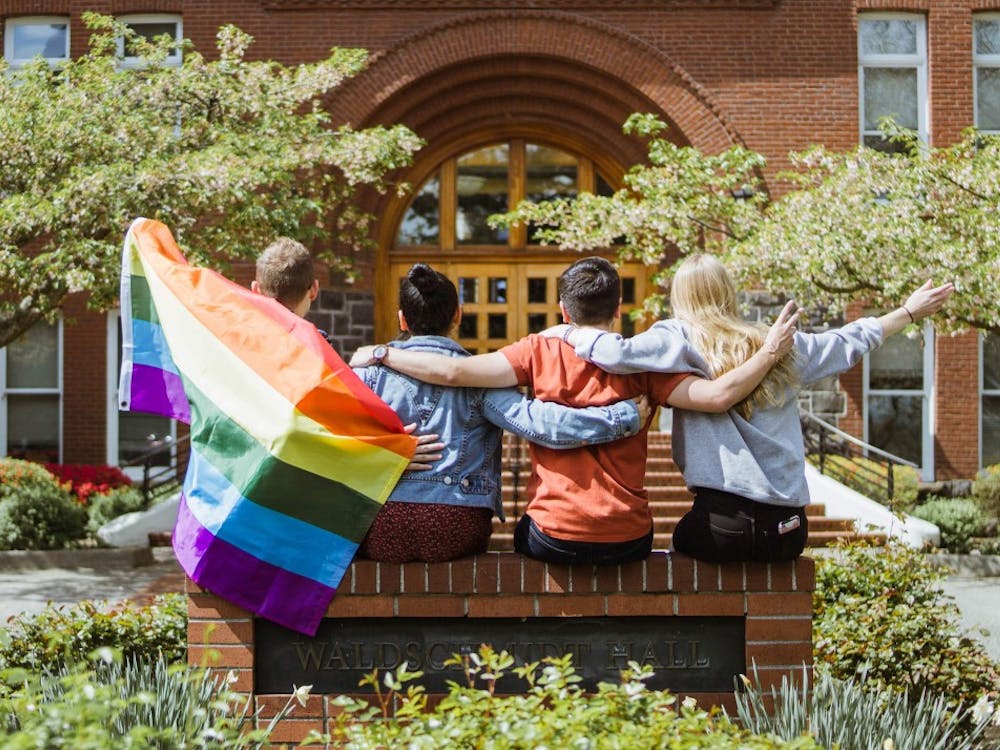I’ve known for almost eight months that I would be graduating from the University of Portland in December instead of May, but it never really sank in that I wouldn’t have my college bubble of protection until just after fall break this semester. I was walking through the front door of Franz Hall, and suddenly nostalgia hit me.
How many more times would I walk through that doorway on the way to class? How many times would I get to quietly sympathize with the faces of overwhelmed and tired fellow Pilots while walking through the quad? When would I ever find myself sitting in a classroom next to my closest friends, pretending to pay attention to a lecture?
Choosing to attend UP for the last three-and-a-half years was one of the greatest decisions I’ve made. But there are definitely some things I wish I had learned sooner that would have made these years seem so much easier.
Now, I could sit here and write out all the really meaningful lessons I learned in college, like which professor had the greatest impact on me or what piece of philosophical knowledge I’m going to always remember, but that would be just about the lamest way I could leave UP and my job here at The Beacon.
Instead, I’m here to share the top five, not-so-serious things I wish I had learned before graduating from college that I never could have learned in any classroom or from any textbook.
1. If you’re going to be late to class anyway, you might as well be a little extra late and grab a coffee on the way.
I, like most college students, would not have survived the consistent barrage of assignments, exams, projects and presentations without an unhealthy amount of caffeine. I think many of my professors would agree that they’d rather have me sitting in class caffeinated and engaged rather than sitting in the back row clicking my pen, trying to stay awake.
Next time you know you’re going to be late to class already, take advantage of the short lines at the Franz Coffee Cart and get yourself a chai. Heck, go crazy and snag a bagel while you’re at it because you should reward yourself for even going to class in the first place.
2. Grades are not nearly as important as internships or work experience (sorry, professors).
It took me one semester too long to realize the importance of internships over grades. Now, before you roast me for discounting grades, hear me out.
Have you ever sat in an interview and had the hiring manager ask you about what grade you got on your last exam in some random core class you took sophomore year? Me neither. But I have had them ask me how my summer internship experience made me a better teammate, or how my on-campus job taught me transferable skills to whatever position I was applying for.
Obviously, you should not purposefully slack off in your classes in favor of a job or internship, because you need some sort of grades to be awarded the sheet of paper that says you’re qualified for a career upon graduation. But if you have some extra hours in your schedule, consider spending it at an internship or getting a job that will allow you to gain real-world experience instead of spending a few extra hours studying concepts that you’ll forget the second you walk out of an exam.
3. For God’s sake, use the freakin’ Writing Center.
The number of students I meet who have never taken a paper to the Writing Center is, quite frankly, absurd. Writing assistants are hand-chosen to be the best of the best writers on campus, and they are available at zero cost to you while you’re a student. It’s kind of a no-brainer to utilize this resource for that super complex theology paper that’s worth 25% of your grade.
Not only are the writing assistants super friendly (and did I mention free?), but they genuinely want to help you get a good grade on your assignment because they’re right in the same shoes as you are.
As an added bonus, I don’t think I’ve ever heard of someone getting a bad grade on a paper that they took to the Writing Center and had the writing assistant send a feedback report to the professor. Unless you just completely missed the prompt of the assignment or plagiarized the entire thing, professors tend to be more forgiving on papers that have a writing assistant behind them helping in the draft process.
4. It’s okay to prioritize sleeping over studying.
Let’s face it, if you aren’t prepared for your 8:10 exam by midnight the night before, a few extra hours at the expense of sleep probably won’t save you. Research and sleep specialists have shown hundreds of times that sleep is the key to solidifying information you learn into your memory. Therefore, sacrificing precious sleep before an exam will actually make you less likely to remember things come exam time.
I wish I had learned this way earlier than I did, because, in hindsight, I might have done better on tests and I probably wouldn’t have the excessive number of sleeping disorders that I do. Please learn from my mistakes, and let yourself sleep the night before a big exam.
5. Don’t force yourself to be friends with people that don’t bring you happiness or value.
One of the most iconic humans alive, Marie Kondo, always says, “Discard everything that does not spark joy.” As a former Beacon colleague of mine argued in a staff opinion, this concept does not just apply to inanimate objects, and I couldn’t agree more.
We all change through college in some capacity, and sometimes that means growing out of friendships that were once strong. It’s never easy, but I learned the hard way that I don’t owe friendship or attention to anyone for any reason. If someone in your life is no longer making you happy or helping you be the best version of yourself, it’s okay to step away and move on. To quote one of my favorite artists, if you can’t find a good reason to be friends with someone, “Drop it like it’s hot.”
As I spend some of my final days as a student on The Bluff, I hope you’ll take some of my nostalgia-fueled advice to heart as you conquer the rest of your time at UP, whether you’re a senior or a freshman. Keep it up, Pilots! Catch you on the flippity flip (come on, I couldn’t write an opinion piece without quoting “The Office” at least once).
Natalie Nygren is the community engagement editor for The Beacon. She can be reached at nygren20@up.edu.








